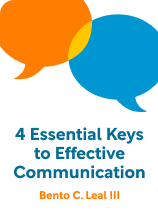

This article is an excerpt from the Shortform book guide to "4 Essential Keys to Effective Communication" by Bento C. Leal III. Shortform has the world's best summaries and analyses of books you should be reading.
Like this article? Sign up for a free trial here.
What is 4 Essential Keys to Effective Communication about? What are the main takeaways of the book?
Two of the most common communication faux pas are the failure to effectively listen and the failure to adequately express yourself to others. 4 Essential Keys to Effective Communication by Bento C. Leal says that these issues result in misunderstandings, hurt feelings, and the inability to resolve problems.
Read below for a brief overview of Leal’s book on communication.
4 Essential Keys to Effective Communication by Bento C. Leal
In 4 Essential Keys to Effective Communication, Bento C. Leal III explains that healthy relationships depend on the ability to effectively and empathetically listen and express ourselves to others. However, many people struggle with these abilities because they’re focused on their own thoughts rather than the person they’re speaking with. When resultant communication errors take place, it’s common for misunderstandings and hurt feelings to arise and for important problems to go unresolved, ultimately damaging relationships. To avoid communication faux pas and the damage they do to relationships, Leal argues that you must integrate empathy into every step of the communication process.
Leal is a best-selling author and relationship skills trainer. From 2005 to 2020, he taught relationship and communication skills as part of a California nonprofit, working with faith-based organizations, family resource centers, county jails, and federal prisons. He’s also the author of the poetry book Band of Angels and 90-Day Gratitude Journal—a workbook to foster gratitude.
(Shortform note: In 4 Essential Keys to Effective Communication, Leal discusses each essential skill in a more-or-less chronological order: changing your mindset first, then listening, then communicating. This is effective because these skills build on each other to provide a step-by-step model for communicating effectively. We’ve synthesized some of Leal’s recommendations to enhance clarity and avoid repetition: Specifically, we’ve combined Leal’s third and fourth keys, “Empathetic Speaking” and “Empathetic Dialogue,” into “Ability #3: Express Yourself with Empathy.”)
Ability #1: Take an Empathetic Perspective
Leal explains that taking an empathetic perspective is the first ability of effective communication. Having empathy is understanding someone’s feelings and experiences from their perspective rather than your own. An empathetic perspective is a frame of mind in which you believe everyone deserves empathy due to their inherent worthiness as unique individuals.
Developing an empathetic perspective is the first ability you must learn because it enables you to listen to others with your undivided attention—the foundation of the other two abilities. When you see someone as unique and having inherent worth, their words hold importance. When you view someone’s words as important, you’ll want to listen closely so that you fully understand them. This internal desire to listen to the other person makes it much easier to give them your full attention, avoid distraction, and gain a complete understanding of their words.
(Shortform note: Some experts agree that empathy is a crucial ingredient, if not the most important ingredient, for moral action and effective communication. Taking an empathetic perspective involves understanding that others have important needs and are deserving of kindness, making us more likely to have effective interactions and avoid harmful communication like bullying. However, other experts argue that viewing people with an empathetic perspective and taking the time to fully understand them might actually inhibit effective communication. This is because people aren’t always equipped to take on the strong emotions of others (by listening and empathizing) and therefore avoid communication altogether.)
There are two main practices of developing an empathetic perspective:
- View yourself as worthy and unique
- View others as worthy and unique
Ability #2: Listen With Empathy
The second ability of effective communication is listening to others with empathy. Listening with empathy has three components: giving the other person your undivided attention, gaining an accurate understanding of their perspective, and making them feel heard and understood.
Leal explains that if you’re unable to listen to another person with empathy, it’s impossible to gain an accurate and complete understanding of their perspective. This prevents you from being able to respond to them appropriately (a key element of Ability #3) and reach a satisfactory end to the conversation.
When we fail to listen to another person empathetically, we’re likely to engage in communication practices that damage our relationship, such as:
- Interrupting the other person or finishing their sentences because we think we know what they’re going to say
- Providing unsolicited advice when the other person actually needs support
- Responding in a way that diminishes the other person’s feelings or experiences
- Responding to a minor point rather than the main idea and going off-topic
Leal recommends three main practices to avoid the negative outcomes of poor listening and instead listen to others with empathy:
- Clear your mind of thoughts
- Focus on their words and body language
- State your understanding
Ability #3: Express Yourself With Empathy
Once you’ve listened to the other person, you must be able to respond to what they’ve said and express yourself effectively. Leal argues that doing so requires you to express yourself with empathy—the last ability of effective communication. Expressing yourself with empathy means clearly and accurately vocalizing your emotions and thoughts in a way that makes the other person willing to listen.
Leal explains that failing to express yourself with empathy often leads to misunderstandings or offenses that can damage relationships. This issue is especially prevalent when people are upset or discussing sensitive topics. When emotions are running high, people tend to speak before thinking and can say offensive, confusing, or inaccurate things.
For example, if you’re angry at your partner for continuing to ignore their chores, your strong emotions might lead you to yell at them and accuse them of being lazy. This might cause your partner to resent you and ultimately damage your relationship.
Leal recommends three main practices to avoid these issues and express yourself with empathy:
- Get organized
- Express yourself clearly and respectfully
- Continue the conversation

———End of Preview———
Like what you just read? Read the rest of the world's best book summary and analysis of Bento C. Leal III's "4 Essential Keys to Effective Communication" at Shortform.
Here's what you'll find in our full 4 Essential Keys to Effective Communication summary:
- How to avoid the two most damaging communication faux pas
- How to listen and express yourself with empathy
- Why having empathy for others starts with seeing the worth in yourself






